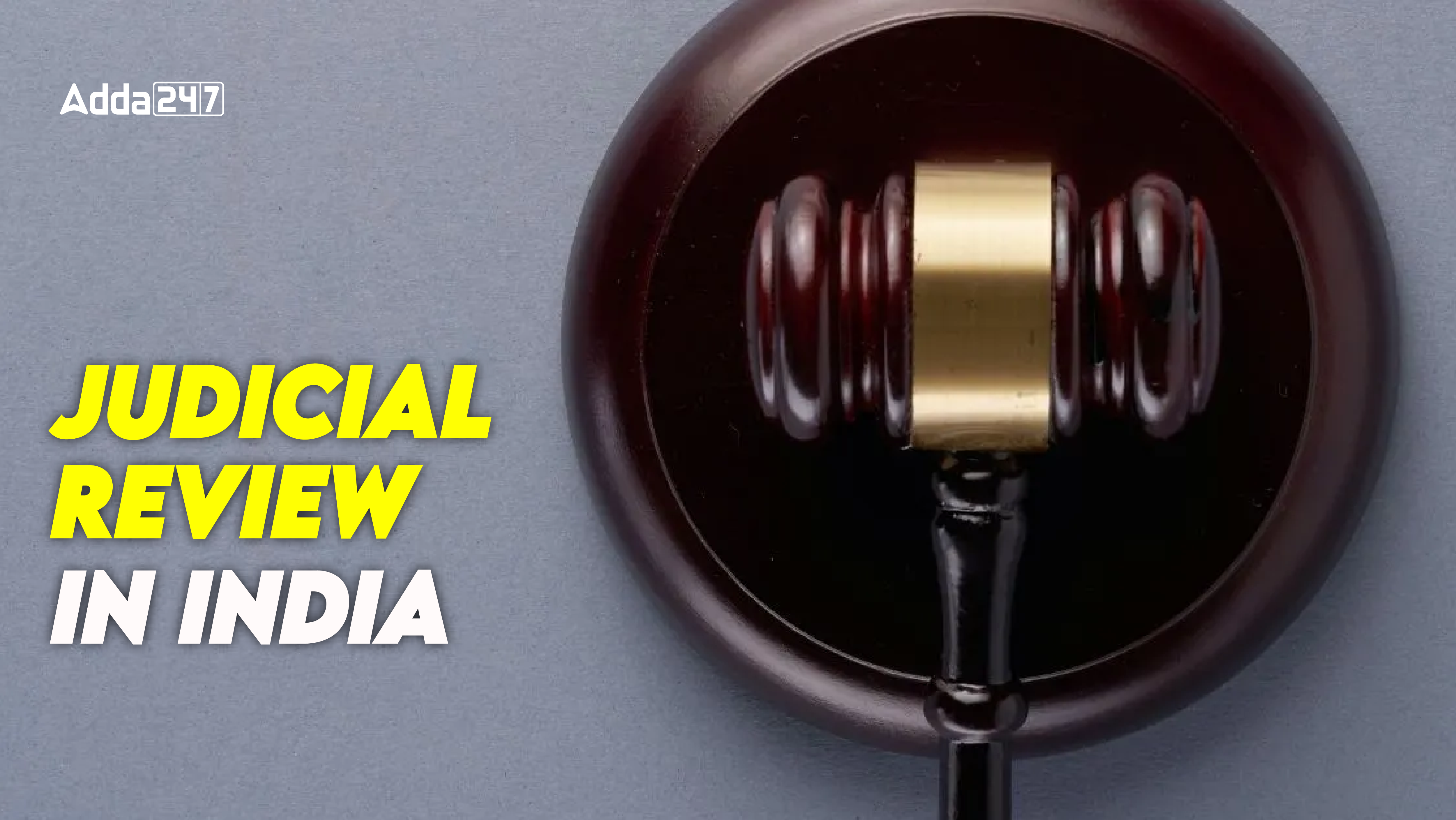Table of Contents
Judicial Review is a cornerstone of the Indian legal system, ensuring that the actions of the Legislature, Executive, and Judiciary adhere to the Constitutional framework. Originating from the U.S. Constitution, Judicial Review in India has become an indispensable feature of the country’s democratic fabric, playing a crucial role in maintaining the balance of power and protecting citizens’ rights.
Meaning of Judicial Review
Judicial review is the power of courts to assess the constitutionality and legality of legislative, executive, and administrative actions. If an action or law violates the constitution, the judiciary can invalidate it, ensuring compliance with constitutional principles and protecting individual rights.
Historical Evolution of Judicial Review
- The concept of Judicial Review in India was first established in the landmark case of Shankari Prasad v. Union of India (1951), where the Supreme Court asserted its authority to review the Constitutionality of legislative actions.
- This power was further reinforced in the Kesavananda Bharati v. State of Kerala (1973) case, which introduced the basic structure doctrine, limiting the amending power of the Parliament to ensure that the core principles of the Constitution remain intact.
- The evolution continued with notable cases like Indira Nehru Gandhi v. Raj Narain (1975) and Minerva Mills Ltd. v. Union of India (1980), which solidified judicial review as a basic structure of the Constitution.
Judicial Review: Scope and Mechanisms
Judicial review in India covers three primary areas:
- Legislative Actions: The judiciary ensures that laws passed by the legislature comply with constitutional provisions. Any law found to violate the Constitution can be declared void. This was seen in cases like Golaknath v. State of Punjab (1967), where the Supreme Court ruled that Parliament could not amend fundamental rights.
- Administrative Actions: Courts examine the legality of decisions and actions taken by administrative bodies, ensuring they adhere to principles of natural justice and constitutional values. The P.U.C.L. v. Union of India case highlighted the judiciary’s role in addressing administrative actions that conflict with constitutional rights.
- Judicial Decisions: Higher courts have the power to review and rectify decisions made by lower courts, ensuring consistency and fairness in judicial outcomes. This aspect was emphasized in L. Chandra Kumar v. Union of India, where the Supreme Court asserted its role in maintaining judicial equilibrium.
Judicial Review: Constitutional Provisions
Several Articles in the Indian Constitution underpin the process of Judicial Review:
- Article 13: Declares that any law contravening Fundamental Rights shall be void.
- Article 32: Provides citizens the right to approach the Supreme Court for enforcement of Fundamental Rights.
- Articles 226 and 227: Empower High Courts to issue writs for enforcement of Fundamental Rights and oversee lower Courts.
- Articles 245 and 246: Ensure that the laws made by the Parliament and State Legislatures comply with Constitutional provisions.
- Articles 251 and 254: Address inconsistencies between State and Union laws, prioritizing Union laws.
- Article 372(1): Establishes Judicial Review for pre-Constitution legislation.
Importance of Judicial Review
Judicial review serves multiple critical functions:
- Protecting Fundamental Rights: Ensures that citizens’ rights are upheld against any legislative or executive actions that may infringe upon them.
- Maintaining Constitutional Supremacy: Acts as a check on the powers of the legislature and executive, ensuring they operate within Constitutional limits.
- Ensuring Judicial Independence: By enabling Courts to review actions of other Government branches, Judicial Review maintains the independence and authority of the Judiciary.
- Preventing Tyranny: Acts as a safeguard against potential misuse of power by the executive and legislature.
Judicial Review: Landmark Cases
Several landmark cases highlight the role of Judicial Review in shaping India’s legal landscape:
- Golaknath v. State of Punjab (1967): Asserted that Parliament cannot amend Fundamental Rights.
- Kesavananda Bharati v. State of Kerala (1973): Established the basic structure doctrine.
- Minerva Mills Ltd. v. Union of India (1980): Reinforced the basic structure doctrine, limiting Parliament’s amending powers.
- Vishaka v. State of Rajasthan (1997): Recognized sexual harassment at the workplace as a violation of Fundamental Rights, leading to significant legal reforms.
Judicial Review: Limitations and Criticisms
Despite its importance, Judicial Review is not without limitations and criticisms:
- Unelected Judges: Critics argue that judicial review allows unelected Judges to overturn decisions made by elected representatives, potentially undermining democratic principles.
- Judicial Overreach: Concerns about the Judiciary encroaching upon the domains of the legislature and executive, leading to an imbalance in the separation of powers.
- Delay and Expense: The process can be time-consuming and costly, delaying justice and policy implementation.
- Lack of Accountability: Judges are not directly accountable to the public, raising concerns about the legitimacy of their decisions in certain cases.
Judicial Review and Judicial Restraint
Recent trends in Judicial Review indicate a cautious approach by the Judiciary. The Himachal Pradesh High Court in Santosh Nanta vs State of H.P. & Ors. (2023) and the Andhra Pradesh High Court in Nallacheruvu Obulesu v. State of Andhra Pradesh & Ors. (2023) have demonstrated judicial restraint, avoiding overreach into executive decisions unless necessary. This reflects a balance between protecting Constitutional values and respecting the roles of other government branches.
Conclusion
Judicial Review is an essential feature of the Indian Constitution, ensuring that laws and executive actions align with Constitutional principles. While it has faced criticisms and challenges, its role in protecting Fundamental Rights, maintaining the balance of power, and preventing governmental overreach is undeniable. As India’s democracy continues to evolve, the Judiciary’s power of review will remain crucial in upholding the rule of law and safeguarding the rights of its citizens.
Sharing is caring!



 TSPSC Group 1 Question Paper 2024, Downl...
TSPSC Group 1 Question Paper 2024, Downl...
 TSPSC Group 1 Answer key 2024 Out, Downl...
TSPSC Group 1 Answer key 2024 Out, Downl...
 UPSC Prelims 2024 Question Paper, Downlo...
UPSC Prelims 2024 Question Paper, Downlo...





